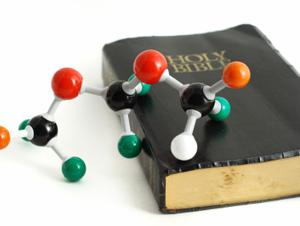Religion, science and public policy
The following is a partial transcript; for full story, listen to audio.
When he announced that the Earth revolves around the Sun, Galileo was persecuted by the Roman Catholic Church. But that was 400 years ago. The modern Vatican, as it is, has argued that Christian faith and science are not at odds after all, but compatible and complementary, especially regarding Darwin’s theory of evolution.
Traditional Protestants are fine with that, but almost half of Americans believe that the book of Genesis is incompatible with “The Origin of Species.” What are the consequences for dealing with global warming, pandemic disease and stem cell research?
John Haught, Senior Fellow at the Woodstock Theological Center has a simple answer: Don’t look to the Bible for answers to scientific questions; look to the Bible for answers to other kinds of questions.
“The Catholic Church itself has emphasized and learned its lesson from Galileo, but Pope Leo XIII … instructed Catholics not to look to the Bible for scientific information, and that simple instruction really serves to prevent a lot of needless anxiety about trying to map onto the Bible the picture of cosmic development that modern cosmology and evolutionary theory, geology has given us.
“So just don’t look to the Bible for scientific information; look for other kinds of truths. For example, in Genesis you look for answers to questions such as, ‘why is there anything at all, rather than nothing; why should we trust in life; is there a basis for hope and confidence in the future?’ Those are the kinds of questions that Biblical text needs to respond to, not scientific questions.”
Gerald McKenny, Associate Professor of Christian Ethics at Notre Dame University, is one of the organizers of a three-day conference on the subject of science and religion. He is trying to present a position on science and its relationship to faith.
“We think that in the past understandings of evolution, due to certain evolutionary theory and the ways in which they were usually presented, made it difficult for many people in the fields like theology, philosophy and even the social sciences, to look to evolutionary biology as a source of truth,” said McKenny. “It seemed to be telling us things about human nature, for example, that made it difficult to understand humans in all their fullness. But we think there are a number of changes that have occurred in biological sciences, evolutionary theory in particular, in recent years that open up new dialogs for science and theology, science and humanities and so forth.”
McKenny adds that the Catholic Church has patronized the area of science for centuries, and still does. “Other people assume that there’s simply a conflict and you’re force to choose one or the other. And I think that’s what we’re in the business of trying to overcome.”
Terry Mortenson, Lecturer and Researcher at Answers in Genesis, an organization supporting the idea of young earth creationism. He says absolutely there’s truth in science, but he doesn’t believe there’s truth to the science of evolution.
“We would dispute that it is a science. It is a story of about the unobserved past. You can’t recreate it in the laboratory, like you can analyze cancer cells. It’s a story about the past, it’s based on assumptions about the past that cannot be proven scientifically. So while it has an appearance of being scientific, it’s in the realm of what we like to call historical science, or origin science, which is trying to reconstruct the unobserved past, which is a different enterprise than trying to develop new technologies or cures for disease in the present.”
Mortenson believes the earth is 6,000 years old, based on the Biblical information provided in Genesis. He says carbon dating and other radiometric dating methods are based on certain assumptions that creationists dispute. He adds that Genesis rules out the idea that people evolved from animals.
Chris Mooney, Fellow in Science Journalism at the Massachusetts Institite of Technology, says people shouldn’t put the same meaning into scripture that they put into scientific text. “Traditional ways of reading scripture recognize various levels of meaning. Scripture could be saying something at a different level from what science says at its level — both can be right.”
Mooney thinks “scientific illiteracy” is threatening our future. “Most literally it means Americans not knowing basic facts about science; but I would expand it to Americans not knowing about the scientific process or how science affects their lives or public policy. In a modern age like ours, if you have a society that isn’t plugged into the scientific world at a time when science really determines a lot of the major choices in public policy, then you’re not going to make the best choices, and I think we see that on the issues like climate change and many others.”
He says on climate change, there’s a “gigantic” gap — like with evolution — between what the scientific community believes and what the public believes.
As for creationism, Mooney thinks it “undermines” the science being taught in schools. “Teachers are afraid in many cases, in many communities, to teach evolution the way they might want to because they know there’s possibly going to be some creationist backlash, so that undermines our citizens’ ability to process science too.”
Hosted by award-winning journalist Warren Olney, “To the Point” presents informative and thought-provoking discussion of major news stories — front-page issues that attract a savvy and serious news audience.
